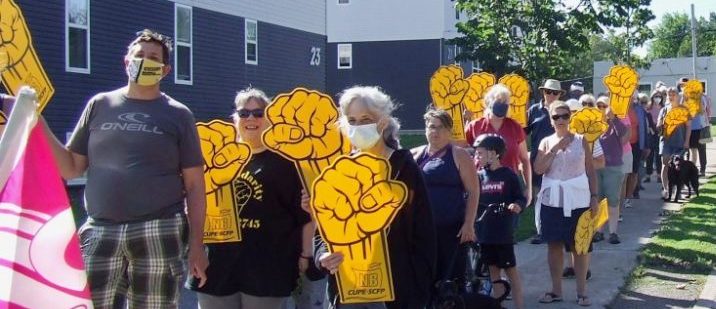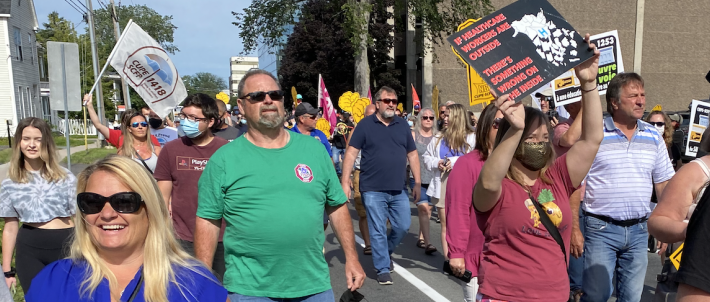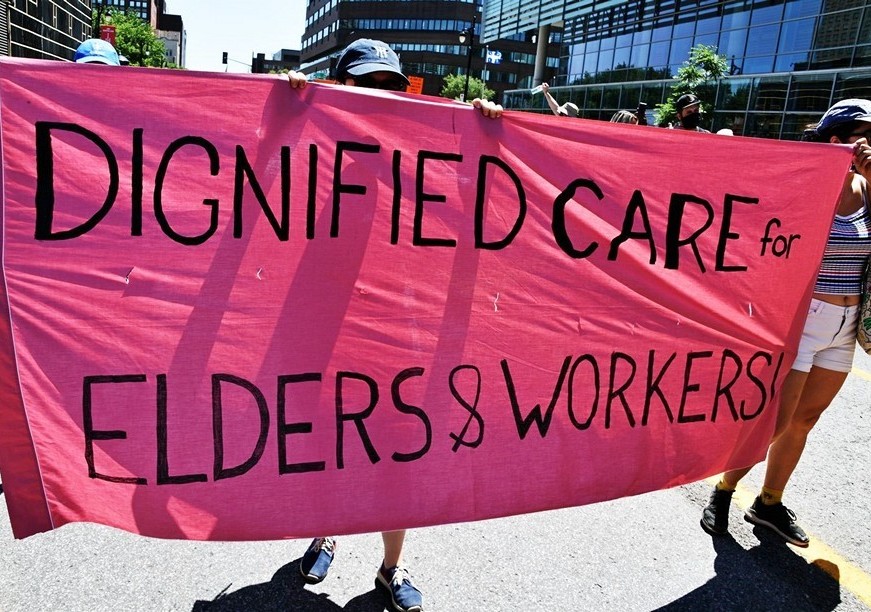|
September 1, 2021 - No. 77
New Brunswick Workers Seek Solution to Crisis
in Recruitment and Retention
Marches Across the Province in Support of Public Sector Workers 
Fredericton, August 28, 2021 (F. Hahn)
• What Participants in Fredericton March Had to Say
• New Brunswick Workers' 100 Days Campaign
Interview
• On the Burning Issue of Workers' Migration Out of New Brunswick
- Daniel Légère
Conditions of BC Health Care Workers
Interview
• Problem of Staff Shortages in Health Care Must Be Solved - Rhonda Bruce
New Brunswick Workers Seek Solution to Crisis in Recruitment and Retention

Sackville, August 28, 2021 (B. Wark)
On August 28, the Canadian Union of Public Employees (CUPE) New
Brunswick organized marches across the province to thank and support
the front-line essential workers who provided critical public services
to the residents of New Brunswick during the COVID-19 pandemic and are
still doing so. Marches were held in 14 communities
with the broad participation of public sector workers, their families
and friends. The marches in Saint John, Moncton, Fredericton,
Edmundston, Saint-Quentin, Campbellton, Bathurst, Tracadie,
Perth-Andover, Woodstock, St. Stephen, Sussex, Sackville and Miramichi
were in support of CUPE New Brunswick's 100 days campaign.
The marches took place a week after the government and the union agreed to central bargaining on wages.
On August 27, CUPE New Brunswick held a day-long Bargaining Forward
Summit, with over 100 CUPE bargaining team members in New Brunswick
present. Union members and the public could watch the event online from
the live feed provided by the union.


In Fredericton, the NB Media Co-op interviewed some of the approximately 250 marchers. Here are
some quotes:
Gail Wylie, Former Civil Servant
"I'm just here in support of all the civil servants. I used to be
one. And I thought about them often as the COVID was going on. I
thought I couldn't have coped as they've done. They're so creative, and
they're so committed, and I just really appreciate the fact that they
kept things going. And especially the health care. I think we should
honour the fact that they are taking risks and they're so talented at
being able to adapt."
Sonny Levasseur, CUPE 2745
"I'm a zone delegate for the Oromocto-Fredericton region [education
support staff]. I'm here to show my support for CUPE. I want to support
all public sector workers, support all front-line workers, that's
basically it."
Sandy Harding, CUPE Maritimes Regional Director
"I'm here for two reasons really. One is that I don't think the
public service workers in the frontline, essential workers, whether
they're unionized or not, have been recognized for the work they've
done in this province. So that's one reason: I think they need a
thank-you. They've held this province together during a pandemic. And
the other
reason is, I'm a mom of five, who has continued to say that I believe
it's the government's responsibility to keep my children in this
province and not tell them to go out to Alberta to get better wages.
And I feel this fight that we're in now can impact us for generations
to come. If we do not do something and invest in our public service
here, and
our public service workers, we'll continue to lose our children to
other provinces, which has an impact. And I'm not willing as a mom to
have my children dispersed all over North America because they're going
to find a better job. I want them in this province. I would love that
they work in the public service, and I want to encourage them. So
that's the two reasons."
Fred Hahn, President of CUPE Ontario
"I'm here from Ontario to show solidarity with our members in New
Brunswick. What's happening here is incredibly inspiring because
frontline workers, public sector workers are facing the same
challenges. Whether we're in Ontario and New Brunswick, Alberta, across
the country, we're the folks who got our communities through the
pandemic, in incredibly stressful, difficult situations. And now,
governments seem to think that somehow, we're the ones who should have
to pay the price for that. And I'm so proud of our members here and the
communities here for standing with them and organizing to say,
‘No, we're not going to stand for that anymore. We're going to
demand
better.'"

 The aim of the New Brunswick workers' 100 days campaign is to break the
mandate of wage freezes and wage restrictions that has been imposed for
over 15 years by successive governments. In the CUPE workers'
negotiations for the renewal of their collective agreements, some of
which expired as long as four years ago, the current
Conservative majority government is insisting upon imposing wage
freezes and restricting wage increases to levels that are well below
the rate of inflation and are actually wage cuts. Workers firmly reject
this dictate, pointing out that this means further impoverishment for
them, the worsening of the retention and recruitment problem in the
public
sector and increased migration of New Brunswick workers to other
provinces.
The aim of the New Brunswick workers' 100 days campaign is to break the
mandate of wage freezes and wage restrictions that has been imposed for
over 15 years by successive governments. In the CUPE workers'
negotiations for the renewal of their collective agreements, some of
which expired as long as four years ago, the current
Conservative majority government is insisting upon imposing wage
freezes and restricting wage increases to levels that are well below
the rate of inflation and are actually wage cuts. Workers firmly reject
this dictate, pointing out that this means further impoverishment for
them, the worsening of the retention and recruitment problem in the
public
sector and increased migration of New Brunswick workers to other
provinces.
The 100 days campaign for negotiated wage increases that workers
deem acceptable ends on Labour Day, September 6. There will be more
than 22,000 CUPE members whose collective agreements have expired who
will be in a legal position to hold a strike vote if the government
persists in trying to impose its dictate.
The New Brunswick government is indifferent to the workers'
arguments as it is blinded by the neo-liberal anti-social outlook that
persists in privatizing social programs and institutions and treating
workers as disposable. They accuse workers of harming the "taxpayers"
when they speak out and fight to improve their wages and working
conditions. Given that it is government pay-the-rich schemes which are
harming taxpayers and undermining public services, these arguments are
contemptible. Providing modern conditions and wages for the delivery of
the services that people need is crucial. The government wants to have
a free hand to further privatize health care and public services to
enrich narrow private interests and the workers are opposing that and
defending public right.

Interview
- Daniel Légère -
Daniel Légère is the President of the New Brunswick Federation of Labour.
Workers' Forum: Migration of workers outside the
province has been a long-standing problem in New Brunswick. You have
often spoken about this. What is your view on how the problem poses
itself?
Daniel Légère: In New Brunswick we have
seen big industries shutting down, mines shutting down, mills shutting
down. These industries employed a lot of very highly skilled workers,
tradespeople. When the industries closed there was nothing left for
them in New Brunswick that paid comparable wages. Two years ago, we
had the lockout of the smelter workers in Belledune by Glencore. There
were a number of those workers that you did not see on the picket
lines. They went out west. They had to pay the bills. In the course of
the lockout, Glencore shut down the smelter for good, and that also
contributed to the migration out West.
As you know, New Brunswick is characterized by its low wage economy.
Government and businesses do everything in their power to keep wages as
low as possible to attract businesses with the promise of maximum
profits. We are in a situation now where many workers’ retirement
plan will be declaring personal bankruptcy. Workers are making less and
less money. Every year they get further behind and many are looking
after their families by using their credit cards. At some point it
catches up to them and ends up in bankruptcy. At a convention that I
attended about a year ago a worker went to the mike and bluntly said
that her retirement plan was personal bankruptcy.
We are seeing a continuous exodus out of the province. This started
about 20 years ago. It has been compounded even more by competition
from outside the province where wages are higher. Employers in New
Brunswick do not want to pay, and that is not just in the private
sector, not just in the mines or in the mills. We see an exodus of
nurses, we see an exodus of psychologists, of psychiatrists. People
don't want to be stuck in this low wage, no benefit economy that we
have in New Brunswick.
That is why we find ourselves in the position we are in right now in
health care. There is a shortage of over a thousand nurses in our
health care system. These are positions that are vacant. That is not
counting nurses who are on stress leave, or sick leave, or maternity
leave. These are just vacant positions that are not being filled.
We see the consequences. Today we see emergency rooms in small
hospitals being shut down on the weekends. Some have completely shut
down. We see maternity wards being closed for weeks on end and
expectant mothers being told "You can't come to our hospital. We just
don't have the staff. You'll have to travel further."
This is not just a problem in hospitals. The biggest problem is in
nursing homes and it manifested itself throughout the pandemic across
the country, especially in privately run for-profit homes where the
owners are trying to get rich on the backs of workers, paying them low
wages and having as few staff as possible. They cut corners to save
money. That is where the effects of the pandemic were the worst, in
private nursing homes.
But this problem exists in our public nursing homes too. For 30
years we have known that they need higher worker/residents ratios, that
there is just not enough staff. The staff shortage has a domino effect.
The more you work short, the more you burn out. Fewer and fewer people
are willing to work in that environment with low pay and a
constant shortage of workers. The problem keeps compounding and the
situation is getting worse and worse.
Personally, I think governments are deliberately letting the public
system fail. They will reach a point where they say that the public
can't deliver the services any more, that they have to turn the system
over to the private sector.
The province's solution to the shortage of workers is to try to fast track immigration,
to recruit workers whose working and living conditions are worse than
what we have here. Government is talking about providing permanent
residency to immigrants. We will see. Some time ago, I attended a
business conference that was framed as a workers' forum. It was a
brainstorming session for businesses on how to get cheap labour. A
representative of a tech company told the story of how he made use of
recruitment programs in countries like India to get workers to come
here and work for long hours for a lot less than what it would cost to
hire someone in New Brunswick. He said that the way he is keeping
them is with the promise of status, the promise of immigration. He uses
the carrot of immigration, he said, to keep them working for almost
nothing. This is horrible. And this was said in a public forum. This is
a race to the bottom and it has to be reversed.
As long as New Brunswick maintains a low wage economy, with
precarious work and precarious workers, we will continue to have an
exodus of workers out of the province.

Conditions of BC Health Care Workers Interview
- Rhonda Bruce -
 Rhonda Bruce is a Rehabilitation Assistant and Regional Vice President, BC Interior, Hospital Employees Union
Workers' Forum: Can you tell us what the conditions are at present for health care workers and long-term care residents in the BC Interior?
 Rhonda Bruce:
I work in a long-term care home. COVID-19 and the public health
measures that were put in place to deal with the pandemic have made the
lives of the workers and of the residents very difficult. Residents
have been isolated and deprived of important social contacts and
workers are overworked and exhausted. We were working short before the
pandemic and that continues. We never have enough staff. Recently our
union did a survey that showed that over 12,000 members of the union,
-- that includes food service, housekeeping, maintenance, and clerical
workers as well as Care Aides, Activity Aides and other members of the
nursing team like me, are contemplating leaving their jobs because they
just can't take the stress any more. Rhonda Bruce:
I work in a long-term care home. COVID-19 and the public health
measures that were put in place to deal with the pandemic have made the
lives of the workers and of the residents very difficult. Residents
have been isolated and deprived of important social contacts and
workers are overworked and exhausted. We were working short before the
pandemic and that continues. We never have enough staff. Recently our
union did a survey that showed that over 12,000 members of the union,
-- that includes food service, housekeeping, maintenance, and clerical
workers as well as Care Aides, Activity Aides and other members of the
nursing team like me, are contemplating leaving their jobs because they
just can't take the stress any more.
After the single site orders were issued last year, the public
health order that required that workers work in only one long-term care
home, the government did take some action to train new Care Aides to
cope with the shortage. They set up the Health Career Access Program
which offered fast-tracked training that the government paid for.
Because many of the workers who entered that program were already
employed in health care, mainly in housekeeping and food services, the
net increase of workers is not going to be enough. If thousands do
leave the system, there may not be an increase at all. And that program
only addresses the shortage of Care Aides, not the shortage of
workers across the system.
The public health orders for masking and social distancing were
changed in BC on July 1 so vaccinated workers did not have to mask but
that didn't last long in the Interior because there was an increase in
cases and now we're right back to masking and social distancing and all
the other COVID-19 protocols. Residents can now have visits
from family so their social isolation is not so bad.
WF: What is the impact of the wildfires that have devastated BC this summer?
RB: We were already pushed to the limit with COVID-19
when the wildfires hit and that has put even more stress on the system.
Some seniors' homes were evacuated and the residents moved to other
homes in the region or as far away as the Vancouver area. Some
residents had to move more than once and when they moved
some of the workers went with them but the disruption in their routines
and surroundings caused all kinds of problems. Families were not always
informed. One Care Aide was evacuated with nine residents from their
facility to one in another community and within days four of the
residents had serious falls. In some cases there was no hotel
accommodation available for the staff who had to make do in makeshift
accommodations in the care homes. Hospitals
have transferred some of their patients to long-term care homes to free
up beds to deal with increasing COVID-19 cases and patients affected by
the wildfires, which puts more pressure on us in long-term care. Many
care
homes have had to stop admitting new residents for the time being.
A lot of workers have been evacuated from their homes. My family was
evacuated for over four weeks. Some workers have had to go far from
their homes so are on leave from work. When you are evacuated and you
need a hotel it can be a problem because all the hotels are already
full with tourists and evacuees from other areas. You can
end up far from home. Being evacuated adds another level of stress and
the help that is provided by the Red Cross is cumbersome -- I was told
I had to drive to a city three miles away to show ID to be able to get
financial assistance. Not everyone can do that.
WF: What does the immediate future look like?
 RB: I am very worried about what is going to happen in
the fall. With the fourth wave and increasing COVID-19 cases and a
staff shortage that was bad before all this and is becoming impossible
now, I don't know how we are going to cope. Management is talking about
going to "essential services." The "essential services" is
something that happens when there is a strike, that the union and
management negotiate an agreement about how many workers have to stay
on the job but also how non-union staff, everyone from the CEO to the
chaplain, are assigned work in different departments, kitchen,
housekeeping and so on. In this situation it would be a way for
management to help out with our work, but that's not really a solution
because all those management people also have jobs to do. RB: I am very worried about what is going to happen in
the fall. With the fourth wave and increasing COVID-19 cases and a
staff shortage that was bad before all this and is becoming impossible
now, I don't know how we are going to cope. Management is talking about
going to "essential services." The "essential services" is
something that happens when there is a strike, that the union and
management negotiate an agreement about how many workers have to stay
on the job but also how non-union staff, everyone from the CEO to the
chaplain, are assigned work in different departments, kitchen,
housekeeping and so on. In this situation it would be a way for
management to help out with our work, but that's not really a solution
because all those management people also have jobs to do.
What really worries me now is the mandatory vaccine policy. All
workers in long-term care have until October 12 to be fully vaccinated
or they will be terminated. My guess is that between 10 and 15 per cent
of my co-workers are not going to be vaccinated. With the annual flu
vaccines there are options for workers who do not get the flu
shot -- masking is one of them and often if there is an outbreak
unvaccinated workers are put on unpaid leave until the outbreak is
over. This is different. I honestly don't know how the system is going
to continue to function if we lose 10 to 15 per cent of our workers.
What is going to happen when that bomb goes off?
WF: Is there anything you would like to say in conclusion?
RB: One thing that is very positive is that the
community has been tremendously supportive. People offer to put
evacuees up in their homes, offer spaces for parking RVs and things
like that. When my father was evacuated from his seniors' home in 100
Mile House to another facility and then ended up in hospital after a
fall,
the Care Aide that had travelled with him and the other residents
brought him some of her husband's clothes because he did not have
enough. People are doing their best to assist one another.

(To access articles individually click on the black headline.)
PDF
PREVIOUS
ISSUES | HOME
Website: www.cpcml.ca
Email: office@cpcml.ca
|

